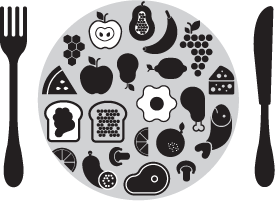Is food combining valid?
by Karen Lamphere, M.S., C.N.
This article was originally published in January 2012

The new year always sparks renewed interest in eating plans that promise better health and weight loss. Food combining is one of the many popular eating plans I’m often asked about as a nutritionist.
The premise of the diet is that proteins need an acid environment to be digested, while starches need an alkaline one. The diet in its most basic terms dictates that proteins and carbohydrates therefore never should be eaten together, and fruit should be eaten alone. That means no chicken and rice, spaghetti and meatballs, or grilled cheese sandwiches. And forget about those convenient fruit smoothies for breakfast!
These combinations are said to impair digestion and nutrient absorption because the carbohydrates ferment and the protein putrefies (rots) in the stomach.
Today there is greater understanding of the digestive process than when this diet first was introduced in the early 20th century, so we can rest assured that for most of us, our bodies digest various food combinations just fine.
Protein is denatured in the stomach by stomach acid. It won’t putrefy because the bacteria necessary to decompose it can’t survive the acidity. The acid is neutralized as food leaves the stomach, and the rest of the digestive process, including digestion and absorption of protein, carbohydrate and fat, takes place in a more alkaline environment.
If eaten with protein, carbs travel along to continue digestion in the small intestine. The notion that they ferment in the stomach doesn’t make sense because the acidity there isn’t conducive to fermentation. Fermentation takes place in the large intestine but isn’t related to the combination of protein and carbohydrate at any one meal.
Food combining does (anecdotally) benefit some people with digestive woes. Some find it helps with weight loss, although the single study that investigated this found it ineffective compared to a balanced diet.
Changing from a diet of processed, refined foods to eating unprocessed, whole foods typically recommended in a food combining diet may help people feel better and lose weight by virtue of the change in the quality of food. They may become more conscious of their food choices, or eat less because meal options are limited. Not overfilling the stomach helps digestion.
That said, digestive problems are increasingly common and food sensitivities definitely can contribute. An elimination diet can help identify them. Aging, stress and overuse of antacid medications all suppress stomach acid, which can impair digestion. Taking lemon juice or apple cider vinegar in water before meals is a gentle way to stimulate stomach acid production and aid digestion.
Looking to traditional cultures for clues about healthy eating is informative. You won’t find any that practiced food combining but you will find practices such as soaking and sprouting of grains, nuts and beans; and inclusion of fermented or cultured foods, such as yogurt, kefir and kimchi, which contain enzymes and probiotic bacteria that aid digestion and nutrient absorption. These diets did not contain refined sugars and processed foods.
People with sensitive digestion might feel better avoiding certain food combinations but it’s individual and certainly not necessary for everyone.
In fact, there are advantages to combining protein, fat and high-fiber carbohydrate in the same meal. Eating this way can minimize blood sugar and insulin spikes, thereby promoting satiety and decreasing sugar and carbohydrate cravings. Clinically, I find this “all-inclusive” way of eating is easier for people to follow and often results in weight loss.
Vegans need to practice food combining, but in a different way. Most vegetarian proteins don’t contain all the essential amino acids (soy is one exception), but combining a bean with a grain forms a complete protein. It was once thought this combination had to be part of the same meal, but as long as beans and grains are eaten over the course of the day it’s fine.
Eating proteins and carbohydrates together isn’t harmful and eating a healthy, unprocessed diet is hard enough for people to manage without imposing rigid, confusing rules that make mealtime even more stressful and complicated, and detract from the enjoyment of food.
Focusing on the quality and the quantity of the food eaten at any one meal is ultimately what matters for most of us, not the “combination.”
Karen Lamphere is a nutritionist in Lynnwood. Contact her at karen@wholefoodsnutrition.com..
